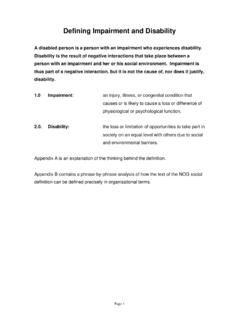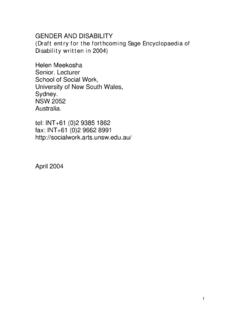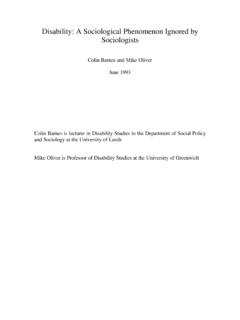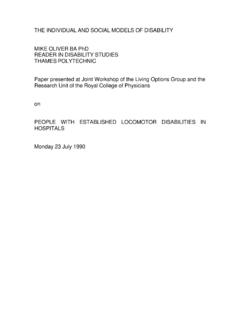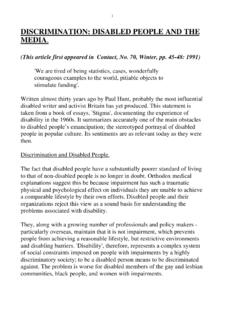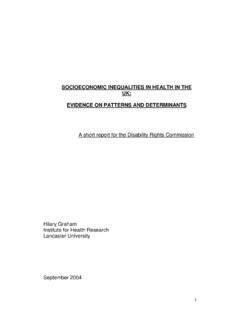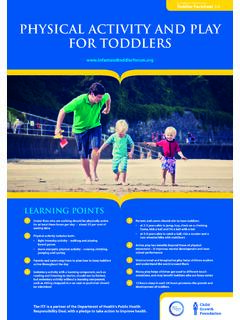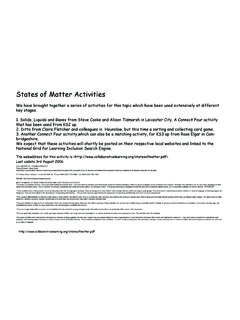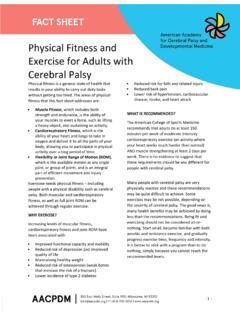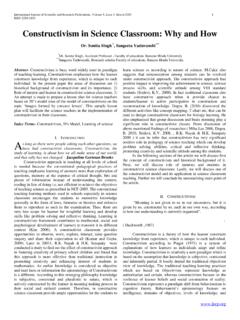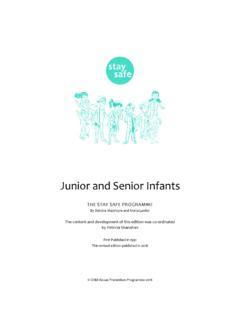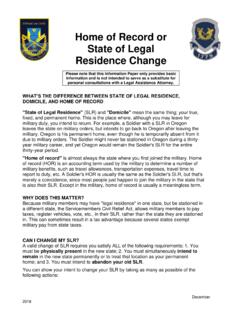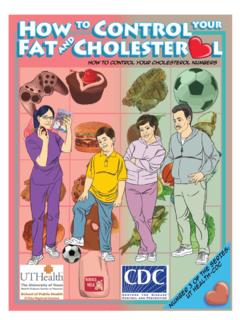Transcription of THE UNION OF THE PHYSICALLY IMPAIRED AGAINST …
1 THE UNION OF THE PHYSICALLY IMPAIRED AGAINST SEGREGATION and THE DISABILITY ALLIANCE discuss Fundamental Principles of Disability Being a summary of the discussion held on 22nd November, 1975 and containing commentaries from each organisation Editor's Note: This unabridged version was electronically scanned and reformatted from the original document by Mark Priestley, in consultation with Vic Finkelstein and Ken Davis (October 1997). The original page numbers are indicated in square brackets and do not form part of the text. All copyright remains with the original authors. INTRODUCTION SUMMARY OF THE DISCUSSION THE UNION COMMENTS ON THE DISCUSSION THE ALLIANCE COMMENTS ON THE DISCUSSION _____ UNION of the PHYSICALLY IMPAIRED AGAINST Segregation: c/o Flat 2, St. Giles Court, Dane Road, Ealing, London, W13 The Disability Alliance: 96 Portland Place, London, W1N 4EX [page 2, original document] Introduction This booklet contains three documents which relate to the meeting held between the UNION of the PHYSICALLY IMPAIRED AGAINST Segregation and the Disability Alliance on 22nd November, 1975.
2 The events leading up to the meeting are briefly outlined in the opening statement of the UNION and presented in the summary document; and in the first paragraph of the Alliance's commentary document. Under the agreed conditions for the meeting, condition 3 d), the discussion was recorded so as to be available for disabled people. People who wish to have copies of the cassette recording, or to borrow it, should contact the UNION to make the necessary arrangements. Following the meeting a summary of the discussion was prepared from the recording and this document, included in this booklet, is accepted by both organisations as an accurate summary, with neither side retaining any reservations. Each organisation also prepared its own commentary on the discussion of 22nd November: these are included in this booklet. November, 1976 [page 3, original document] Summary of the Discussion Summary of the tape recorded discussion between the Disability Alliance and the UNION of the PHYSICALLY IMPAIRED AGAINST Segregation, held on the 22nd November, 1975 Speakers: Alliance: Paul Lewis, Bent Stueland, Charles Taylor, Peter Townsend UNION : Ken Davis, Liz Finkelstein, Vic Finkelstein, Paul Hunt Observers: Approximately six each from both organisations Peter Townsend apologised for the absence of Dr.
3 Fred Reid and Betty Veal from the Alliance side; and he then sorted out a complication which arose when he said, "I hadn't really made the distinction between speakers and observers", as had been required by the conditions agreed for the meeting. The speakers were then introduced, and PAUL HUNT read out the following statement which had been prepared by the UNION : "Firstly, we want to emphasise that we very much welcome this meeting between the Disability Alliance and the UNION of the PHYSICALLY IMPAIRED . In our view, it represents a step forward for our two organisations to be meeting on the basis of agreed fundamental principles, and with the purpose of considering ways in which disabled people can become more active and involved in their own affairs". "Secondly, we think it will be helpful to set out very briefly the origins of this present meeting. Our UNION published a Policy Statement at the beginning of the year, and a copy was sent to Peter Townsend on a personal basis.
4 He wrote to us in April, saying he fully supported all our objectives and would like to become an Associate Member. However, he also made a number of statements about the Disability Alliance, which appeared to us to conflict with the UNION 's Aims and Policy Statement; so the Executive Committee of the UNION wrote to him, detailing the apparent differences and asking him for clarification of his position. He replied saying we had raised a lot of extremely important points, and suggesting a small meeting between the UNION and the Alliance to try and clear up what he thought might be misunderstandings on both sides. Following the meeting, he would be glad to write a reply to the points we had made". "The answer from the UNION was that we had carefully considered our comments, which were the fruit of 13 months' careful, democratic discussion; and in the absence of any further information we saw no reason to suppose there were any misunderstandings on our side.
5 However, we welcomed the idea of a meeting between the Alliance and the UNION , provided there was prior agreement on certain fundamental principles, on the purpose of the meeting, and on the conditions under which it took place. We made the following proposals: 1. Fundamental principles to which we are both in agreement: disability is a situation, caused by social conditions, which requires for its elimination, (a) that no one aspect such as incomes, mobility or institutions is treated in isolation, (b) that disabled people should , with the advice and help of others, assume control over their own lives, and (c) that professionals, experts and others who seek to help must be committed to promoting such control by disabled people. 2. Purpose of the meeting: (a) to consider ways in which disabled people can become more active in the disability field, and (b) to consider a long-term programme of action to involve disabled people in discussions about their own affairs.
6 3. Conditions of the meeting: (a) there should be an equal number of representatives from the Alliance and UNION , up to a maximum of 4 each, (b) the number of observers from the two organisations should also be equal, (c) both organisations will seek maximum publicity about the discussion and results of the meeting, to bring it to the attention of as many disabled people as possible, and (d) the proceedings should be tape recorded and made available to disabled people. "All these proposals were accepted by Peter Townsend for the Alliance, and so today's meeting was arranged. "Coming to the discussion we are about to have, we regard the Alliance's agreement to the fundamental principles just quoted as an extremely important development. It ought to clear away the ground so that we can get down quickly to discussing practical ways of helping disabled people to become more involved in their own affairs.
7 However, there are still some points we need to question about the Alliance's approach to disability. Basically we should like to know how the recently agreed fundamental principles are seen to tie in with the Alliance's aims and policy and what it is actually doing. "Our own position on disability is quite clear, and is fully in line with the agreed principles. In our view, it is society which disables PHYSICALLY IMPAIRED people. Disability is something imposed on top of our impairments, by the way we are unnecessarily isolated and excluded from full participation in society. Disabled [page 4, in original document] people are therefore an oppressed group in society. It follows from this analysis that having low incomes, for example, is only one aspect of our oppression. It is a consequence of our isolation and segregation, in every area of life, such as education, work, mobility, housing, etc.
8 Poverty is one symptom of our oppression, but it is not the cause. For us as disabled people it is absolutely vital that we get this question of the cause of disability quite straight, because on the answer depends the crucial matter of where we direct our main energies in the struggle for change. We shall clearly get nowhere if our efforts are chiefly directed not at the cause of our oppression, but instead at one of the symptoms. "The correct direction for the UNION 's main energies follows from our view of the cause of our oppression. We see the essential task, at this point in time, as that of helping disabled people to organise together to take a more active part in struggling for the changes in society which will ensure that we are brought into the mainstream of life, rather than being excluded. We are concentrating on building up an independent, democratic organisation of disabled people, which has solid foundations and which is increasingly clear about the cause of disability and about the changes required to overcome it.
9 "In time the UNION will become strong enough to enter into principled alliances with other organisations, to bring our weight to bear in Parliamentary work, and so on. Of course we welcome every scrap of cash that can be wrung from Parliament for disabled people. Many of our members have worked for this in DIG for years. But it was partly this experience in DIG which brought us to the realisation of the need for a more comprehensive organisation with a wider view of disability. DIG's restriction to the incomes issue has led to an increasing concentration of effort on Parliamentary work, with a small number of experts having an ever more important role, but the majority of members remaining largely passive. DIG appears to be losing its potential as a mass, democratic organisation of disabled people precisely as a result of limiting itself to attacking the one 'symptom' of low incomes.
10 "We as a UNION have drawn the necessary lesson from this experience in DIG, and therefore our UNION 's Aims and Policy Statement place incomes firmly in the context of the wider struggle for us to participate fully in society, and so achieve our emancipation from all aspects of our oppression, including poverty. "By way of contrast with our clear position on disability, that of the Alliance appears to be a contradictory one. The Alliance was presumably founded because DIG was thought to be inadequate in some way. But as far as we know there has been no public statement of what deficiencies in DIG made another incomes organisation necessary. This seems strange because the incomes proposals of the two organisations are very similar except for a few details. Nor is the new organisation any more democratic than DIG on the contrary, it appears to be less so. And in fact the Alliance seems to have built on precisely those weaknesses in DIG that we have identified and avoided in the UNION the restriction to the incomes issue, the reliance on experts, and the concentration on Parliamentary pressure.
